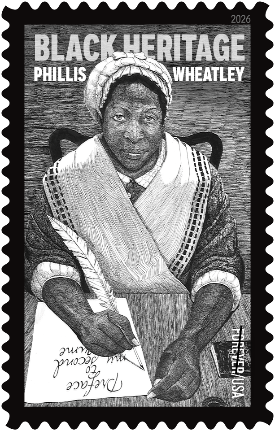-
What:
-
The U.S. Postal Service is honoring Phillis Wheatley (1753-1784), the first author of African descent in the American Colonies to publish a book, with the 49th stamp in the Black Heritage series.
The first-day-of-issue event for the Phillis Wheatley Black Heritage stamp is free and open to the public. News of the stamp is being shared with the hashtag #BlackHeritageStamp.
-
When:
-
Thursday, Jan. 29, 2026, at 11 a.m. EST
-
Where:
-
Old South Meeting House
310 Washington St.
Boston, MA 02108 -
RSVP:
-
Attendees are encouraged to register at https://www.usps.com/philliswheatleystamp
-
Background:
-
Born in West Africa and brought to Boston on a slave ship, Phillis Wheatley was enslaved but educated in the Wheatley household. Wheatley published her first collection, “Poems on Various Subjects, Religious and Moral,” in 1773. This collection showcased her impressive mastery of various poetic forms, including hymns, elegies, and narrative verse, securing her place in history. Freed from slavery that same year, she went on to correspond with figures such as George Washington, who praised her poetic talent.
Wheatley’s legacy continues to inspire generations, earning her the title “the mother of African American literature.” Before the Civil War, abolitionists used her accomplishments to affirm the intellectual capability of people of African descent and argue against slavery. Today schools, libraries, community centers and university buildings across the country have been named for Wheatley, and she has been the subject of numerous inspirational books for children. In 2003, a statue of the poet was included in a new Boston Women’s Memorial. The first full-length scholarly biography of Wheatley was published in 2011, with a second biographical study published in 2023, part of an ongoing effort to recognize her resilience in adversity.
Antonio Alcalá, an art director for USPS, designed the stamp using an existing portrait by Kerry James Marshall.
The Phillis Wheatley stamp will be issued in panes of 20. As a Forever stamp, it will always be equal in value to the current First-Class Mail 1-ounce price.
Postal Products
Customers may purchase stamps and other philatelic products through The Postal Store at usps.com/shopstamps, by calling 844-737-7826, by mail through USA Philatelic or at Post Office locations nationwide. For officially licensed stamp products, shop the USPS Officially Licensed Collection on Amazon. Additional information on stamps, First Day of Issue Ceremonies and stamp inspired products can be found at StampsForever.com.
# # #
